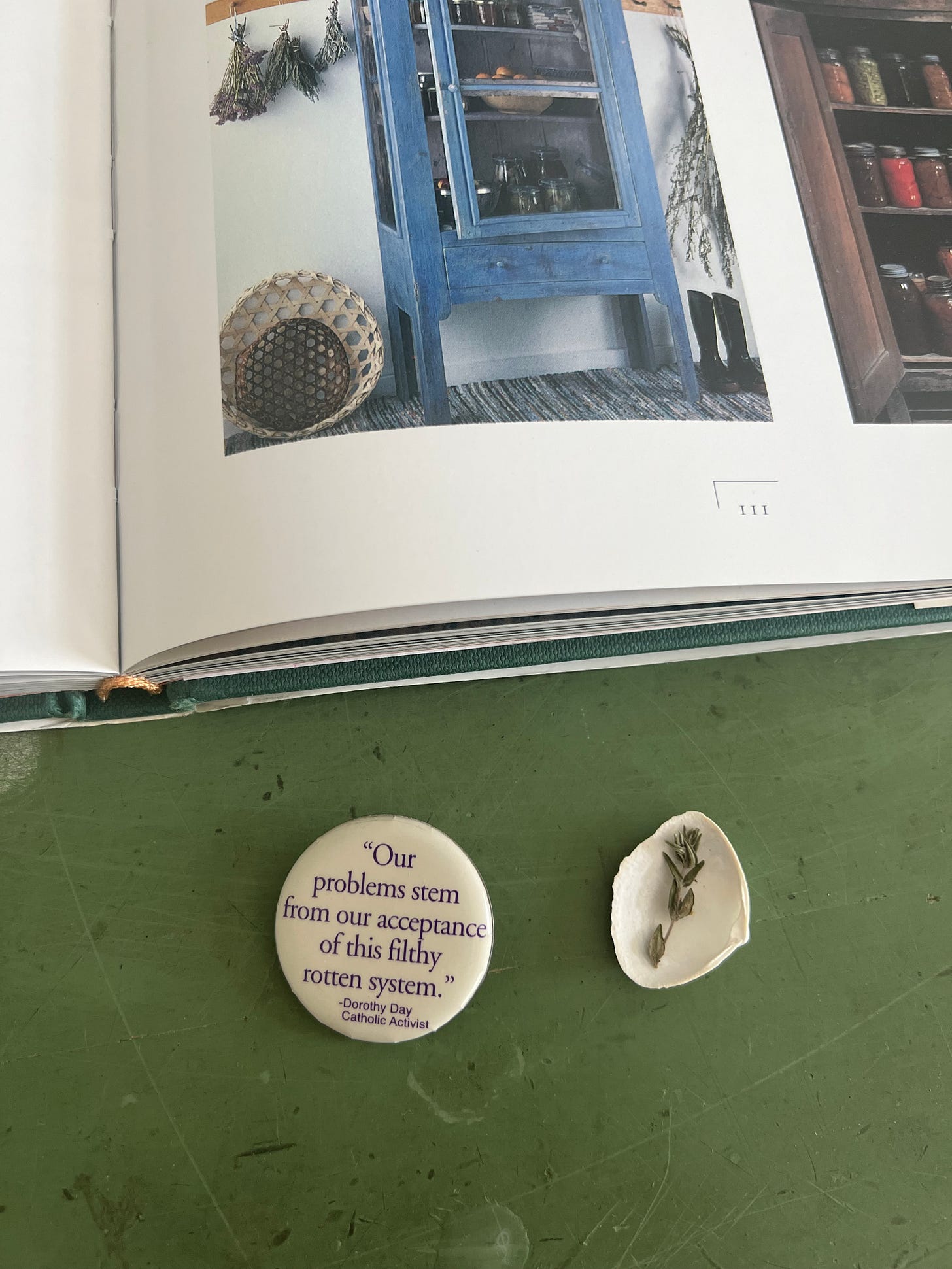Every now and then, when I’m walking around, a strange phrase comes into my head.
Maybe the woke people are right.
Not about everything, of course, but about one fundamental aspect of American life: the acknowledgment of suffering.
To acknowledge suffering, without immediately capitulating to the idea of victory over it, is deeply un-American. The second sentence of the Declaration of Independence states that we have an unalienable right to the pursuit of happiness. Happiness is not only a value in America but an imperative. And one of the things that most bothers the Right about the woke is their insistence on the undeniability of victimhood. This, to the Right, is the poisonous, the radioactive, the to-be-avoided-at-all-costs “victim mentality.” And I confess that I have been among those who have recoiled at this spirit, when I’ve seen it.
But I am beginning to realize that I have been gravely wrong about this facile rejection of reality, and about other things, too — namely the importance of safety and protection for women in society.
Safety, like acknowledgement of suffering, is not an American value. We are risk-takers, rugged daredevils, and rabble-rousers, constantly in a contest to see who can out-butch the other — who can shoot faster, eat more bacon, secure the bag quicker, hunt more moose, and utter more “America-fuck-yeahs” per second. A certain measure of earnestness is permitted. Earnest is ok in America. Vulnerable is not.
After a series of situations, both in community and in the workplace, in which I reached out to others for support and was told that nothing substantive could be done and that I was essentially on my own, I have come to see the cracks in the “every-person-for-herself” mentality. I do not believe in societies that leave individuals to twist in the wind. The word solidarity is becoming more and more important to me.
I am even beginning to deviate from my old pal Camille Paglia, whose vision of “Amazon feminism” in which each woman is an Athena-like warrior, battling her way through the wilds of American culture, feels off the mark and unsustainable. I have always hated the term “strong woman,” as though women weren’t inherently strong and their strength needed to be noted, or as though any woman who displays more traditionally feminine qualities such as softness, tenderness, and receptivity is inherently weak. It seems to me that an environment in which only the butchest of women deserve safety, as though safety were something to be earned, is the emotional corollary to the kind of economic libertarianism that results in only super-high achievers being able to make a decent living. Normal hard-working people, in this scenario, are deemed unworthy of being able to support a family, just as traditionally feminine women are told they are somehow unworthy of safety.
To tell a woman in an unsafe situation that she is on her own, that there is nothing wrong with the environment and nothing that can be substantively changed, is the equivalent of Kevin Williamson’s statement to rural Americans that they should simply pack up their belongings and U-Haul it out of there to a place with more prosperity. Men will be men and the market will be the market. That is all there is to say. And anyone who insists that the problem is the system rather than themselves is in denial, needs to buck up, needs to get out of “victim mentality.”
I reject this. Because sometimes people simply are victims. Of a rigged economy, or of the poor behavior of others. And acknowledging that reality does not mean this state is permanent. It means something must be done to change the situation, and in many cases, this “something” comes in the form of aid from others, or from a power beyond oneself.
Yet the butch model persists. It is comfortable for us, as Americans. The TikTokers, emo kids, millennials and Zoomers who have taken to social media in the last two decades to talk about suicide, about cutting, about domestic violence, dissociation, abuse, and despair make us deeply uncomfortable. How dare they acknowledge pain, a fundamental part of human existence? How dare they show emotion without immediately drying their eyes so they can be productive in the market? How dare they suffer out loud? Why, people in my generation walked 15 miles just to never show our suffering to anyone! These kids have victim mentality!
The First Eucharistic Prayer in the Catholic Church describes Christ as a “pure victim,” a “holy victim,” and a “spotless victim.” There is nothing wrong with being a victim. God Himself was one. It is strange to be an American Catholic, and to hear this word repeated with such reverence during the Mass, when in the rest of society it is spat upon with such denigration. The victor-victim split in the American psyche, which roughly correlates to the Right and the Left and demands that a person claim one mentality or capitulate to the other, is just another symptom of division in a populace that desperately needs to be whole.
The woke focus on mental health (or in other words, the state of one’s soul), therapeutic culture, and confessional self-disclosure online may be grating. But I am old enough to remember the way things were before: family problems were hidden compulsively, depression and anxiety were seen as moral failings, and anything other than sunny positivity was regarded as wrongheaded. It’s part of why I became goth and devoted myself to that lifestyle for so many years. I needed to fill in the gaps of what American culture lacked, to grasp for some sense of mystery, solace, and redemptive yearning in a society that offered none.
A tweet from the Free Press reporter Olivia Reingold in February perfectly illustrated the adulation that recapitulation to the butch mentality receives. It has over 13,000 likes, 4,000 bookmarks, and almost 2,000 reposts. In it, Reingold shares that after an anxious childhood she developed an eating disorder as an adult. “Gentle parent[ing]” didn’t work for her, but the tough approach of an aunt did:
When I told her I was contemplating throwing up a meal, she told me she’d like to have a word with my eating disorder: "Yeah," she'd say. "Can you tell it to shut the fuck up?"
This is what worked for her and helped her find a way through disordered eating. But make no mistake, this is the ole’ willpower model. And it’s not going to work for everyone — particularly those whose afflictions are severe. Try telling your fentanyl addiction to “shut the fuck up.” Try telling someone’s life-threatening depression to “shut the fuck up.” Try muscling your way out of domestic violence on your own. Try telling someone with a chronic illness that they just need to “get over it.” Try telling a friend whose anxiety is consuming them that you think they’re “stronger” than that. I hate this shit. I have butch fatigue.
One of the things this way of thinking misses is that there are sometimes things that are out of our control. We are not omnipotent. And in the face of such terrifying forces or situations, it is not the brute impact of our limited personal wills that makes the difference, but the appeal to an entity greater than ourselves and the solidarity of others in that effort. There is a way out and a way through, but it is not through individual straining alone.
The writer Samuel Kronen, who is living with a condition known as ME/CFS, has spoken eloquently on the inefficacy of the “buck up” approach to affliction:
While I appreciate the value of toughness and coolness, these things have honestly not helped me much in my struggle with chronic illness and disability and at times have actively hurt me, and I think people put too much weight into them anyways … Tough love is cold comfort to the person who is truly suffering.
He continues:
At least one of the reasons we have seen a surge in therapeutic trauma-talk over the last few decades is because, frankly, it’s better and often truer than the silent toughness and coolness that came before it, though you can certainly argue it’s an over-correction … What people call “wokeness,” I think, is really an unstated attempt, however noble or ignoble, to morally make sense of the world’s suffering, though I don’t think it’s universal enough to succeed and gets caught in the weeds on the particulars.
In an essay that touches on Ross Douthat’s 2021 Lyme disease memoir “The Deep Places,” Kronen makes a crucial point:
The idea that you could be permanently disabled from a minor infection is not something anyone is really anxious to believe, going against all of our ethics around work and toughness and contradicting the modern compulsion to stay busy.
This, I think, is the issue. Acute suffering — whether from addiction, physical illness, or mental illness — often takes people out of the workplace. And in the American psyche, or at least a psyche tinged by the last forty years of neoliberal economic policy, a human being without work is a human being without value. Human beings are not regarded in our philosophical system as having innate value and dignity, regardless of their ability to be economic producers.
This is why anything other than the “toughness model” makes some, particularly older Americans, so uncomfortable. Because it suggests that there is innate value and dignity even in a person who cannot “survive independently” — and this goes against the American civic religion. It’s the same issue with pro-choicers — an unborn child is considered “viable” once it can live outside the womb. Independent beings deserve to live, dependent beings do not.
Slights against this worldview make people furious. And I suspect that one of the reasons they defend it so strenuously is that deep down, they know it’s bullshit. Every sensible human being knows that we are interdependent on each other. No human being is truly independent.
After driving through Pennsylvania, Ohio, and Tennessee, Chris Arnade writes in a brutal Substack from August 9th that
In the nine years since the last American Dream trip, I’ve come to realize I don’t like America, not as a place to live. We have an ugly, selfish, winner-take-all culture — devoid of community, meaning, and the majestic — and almost all our policy is built around the notion that individual liberty, with the most stuff at the cheapest price, is the ultimate good.
Throwing checks or other material benefits at the disenfranchised doesn’t work because
we can’t grasp that the problem isn’t about the economic, but about the spiritual, isn’t about building another basic housing complex, another road, another shopping mall, but about building more cohesive and meaningful communities.
He waxes about an American life that is
boiled down to the most utilitarian goal of maximizing stuff and minimizing cost, with any of the shared communal-ism the rest of the world understands as essential to what a fulfilling life means long ago washed away by our dismal culture of stripping everything of the sublime.
Yes, this is negative, but I am thankful to Arnade for telling the truth. It doesn’t matter to me where someone falls on the political spectrum. If they speak out against economic bootstrapping — as well as the emotional bootstrapping that goes along with it — they are speaking my language. Wendell Berry, whose work I am discovering with a deep sense of identification, talked about the “indissoluble” connections that are “obscured” by modernity. “If these connections do necessarily exist,” he said, “as I believe they do, then it’s impossible for material order to exist side by side with spiritual disorder.”
An essay that has stuck with me ever since I read it three years ago, whose lines every now and then surface in my consciousness, is Matthew Sitman’s “Leaving Conservatism Behind” from Dissent Magazine in 2016. Here, Sitman speaks of a conservatism that is closely allied with economic libertarianism. Thankfully, newer generations of conservatives are seeking an economic approach that would truly protect the things conservatives care about — tradition, family, and community — but those green shoots had yet to spring in the mid-2010’s. Explaining how he came to embrace a more leftist class politics, Sitman talks about the failure of the Right to “attend to the world as it actually exists, the world in its suffering and hardship,” as well as his growing awareness of “how suffering and hardship are so often unchosen and undeserved by those who endure it — and prolonged and deepened by a political system that assumes they are due to failures of ‘personal responsibility.’” He is skeptical of “claims of capitalist efficiency and the dictates of ‘the market,’” as well as the idea that “ambition” or “virtue can conquer the brute force of circumstances.” These “condemn us to a world where grace must be earned rather than freely given.” He prefers to recognize that “we are bound in ways we do not choose; that we are constrained in ways that the exertion of our wills may never overcome. This is not to concede too much to defeatism or despair, but to resist making heroism a requirement for a decent life.” Like me, he is looking for “a form of solidarity, a way of joining together in our shared fallibility and weakness, and shaping our life together accordingly.” Thinking of all that his loved ones have endured in “a country stacked against their material well-being and interests,” he knows deep down that “it does not have to be this way.”
One of the hallmarks of the butch-libertarian or even cavalier-centrist stance is that it dismisses anyone on the Right or the Left who is looking for change as a pussy, a whiner, or a grievance-monger. These status quo-ists think that the complaints of the current moment are simply an aberration to be quashed, and then everything will return to the pleasant liberal order that preceded our era. They are mistaken. You can’t put toothpaste back in a tube. In her 2021 book “On Freedom,” author Maggie Nelson questions Laura Kipnis’s critique of late-2010’s feminism, “Unwanted Advances.” Kipnis is “telling a story,” Nelson says, that “gleefully embraces a totalizing script of intergenerational warfare … I have a hard time seeing how this script serves anyone beyond the person speaking it. Belittling a generation of impassioned activists and their concerns because they conflict with one’s own history or sensibility does not seem to me particularly wise”… neither is “trying to shame people into … liberation.”
Ross Douthat similarly advised in 2022 that “the liberal” who would wish to preserve the current stasis “needs to be able to look even at forces that seem most threatening, whether the Trumpist right, the illiberal left or something else, and recognize in them impulses and desires and demands that require satisfaction, not just denunciation.” This is because liberalism “isn’t really a political-moral-theological system in full; rather, it’s a deliberately thinned-out structure designed to manage pluralism, which depends on constant infusions from other sources, preliberal or nonliberal, to generate meaning and energy and purpose … the liberal order also cannot live without the forms of regeneration, solidarity, creativity and — above all — metaphysical hope that a postliberal impulse reaches for and that liberalism alone struggles to supply.” But something about this formulation makes me sick as well. Is the present system simply to remain in place, grabbing and devouring impulses from more instinctual or spiritual sources outside itself, and thereby dissipating them? Weakening them just enough to extract their juice, while crushing their fruit?
No. It isn’t enough. Freedom as the ultimate value in a society is not enough to make people happy. I know I’m contradicting things I’ve written before. But even patriots are not immune to the desire to flee, to denounce something that doesn’t work.
There is something about living in our supposedly liberal society — which feels more like a combination of authoritarian secularism and free-market supremacy — that’s like having a shirt on that is two sizes too small, or shoes that are too wide. At a certain point, you just want to cast them off. Liberty is the ability to live by the integrity of one’s conscience, and my conscience is telling me something is wrong. Or at least that it’s shifting in a very deep way, like tectonic plates beneath the earth. Whatever the new thing is — re-enchantment, wokeism, or conservative populism — it’s already here. The symptoms may not be full-blown, but it’s like the chill you feel on your skin before you get the flu. And anyone who convinces themselves this isn’t so is like a soul about to succumb, forcing themselves to go into the office anyway.
I find community life very difficult. I’m a typical American — individualistic, contrarian, a natural anti-authoritarian. All it takes in a group setting is for one person to put the pressure on me or get invasive or tell me what to do and I want to break their teeth in (I’m working on that). But something has to give. It is not good for us to be alone.
Suffering brings us closer to God, and is nothing to be ashamed of. It can be overcome, and even when it can’t be overcome, it can be transcended. What would the Apostle Paul make of our anti-fragility mania? “I take pleasure in infirmities,” he wrote. “For when I am weak, then am I strong.” Out beyond the victor-victim divide, there is resurrection mentality — the idea that things can get better, that wounds can heal. That’s why I try to follow Christ and not a candidate. Ideologies reign, and then are defeated. God’s love is forever.






